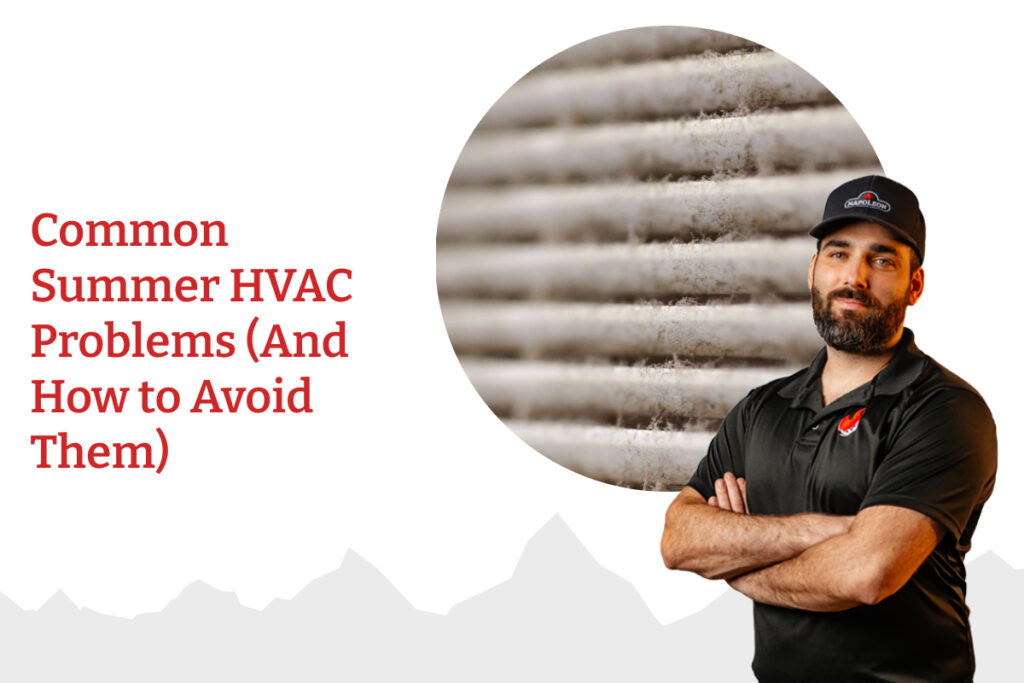As temperatures rise, your HVAC system becomes one of the most crucial components of home comfort. Unfortunately, summer also brings a host of common HVAC problems that can disrupt your cooling and strain your system. From overheating compressors and clogged filters to refrigerant leaks, knowing how to prevent these issues is key to keeping your system running smoothly. Booking regular air conditioning maintenance in Winnipeg is one of the best ways to ensure your unit can handle the heat when it matters most.
At Whyte Ridge HVAC, we’ve seen firsthand how a bit of seasonal preparation can save homeowners from discomfort, stress, and costly emergency repairs. Staying ahead of summer HVAC problems not only improves performance and longevity but also helps reduce your monthly utility bills by keeping the system efficient.
Overheating HVAC Units
One of the most frequent summer issues we encounter is HVAC units overheating. Air conditioners work hardest when outside temperatures soar, and if the system is poorly maintained or overworked, it can easily overheat. This can cause the unit to shut down unexpectedly or, worse, damage critical components like the compressor.
Dirty condenser coils, lack of airflow, and blocked outdoor units are the leading causes of overheating. If debris like grass clippings, leaves, or dust builds up around the outdoor condenser, it restricts airflow and makes the unit work harder to release heat.
To avoid overheating, keep the area around your outdoor unit clear of debris and vegetation. Schedule a professional tune-up at the start of the season to ensure the coils are clean and the system is in peak condition. If your unit frequently shuts off in the middle of a heatwave, it’s time to call a technician.
Clogged Air Filters
Air filters are a small but essential part of any HVAC system, and they tend to get clogged faster during the summer months. Pollen, dust, pet hair, and other particles accumulate quickly, especially when windows are left open or foot traffic increases. A clogged air filter restricts airflow, which reduces your system’s efficiency and forces it to work harder, leading to higher energy bills and potential mechanical problems.
Neglecting filter changes can also result in frozen evaporator coils and decreased indoor air quality. The solution is simple: check your filter every month during the summer and replace it if it looks dirty. For homes with pets or allergy sufferers, more frequent replacements may be necessary.
Refrigerant Leaks
Another common summer HVAC problem is low refrigerant levels due to leaks. Refrigerant is the lifeblood of your cooling system—it absorbs heat from inside your home and releases it outside. If there’s a leak in the refrigerant line, your system may struggle to cool effectively, run longer cycles, and cause uneven temperatures throughout the home.
Signs of a refrigerant leak include hissing sounds near the indoor unit, ice buildup on the evaporator coil, and a noticeable drop in cooling performance. Not only does a refrigerant leak compromise comfort, but it can also damage your compressor if left unaddressed.
If you suspect a refrigerant issue, it’s essential to have it diagnosed and repaired by a certified technician. Handling refrigerant requires special training and must comply with environmental regulations, as improper disposal can harm the ozone layer.
Thermostat Malfunctions
Thermostat problems are often overlooked, but they can cause significant cooling issues. If your thermostat isn’t calibrated properly or has faulty wiring, it might not accurately reflect the temperature in your home. As a result, your system could run too often or not enough.
Battery-powered thermostats may simply need fresh batteries, while programmable or smart thermostats may require a settings reset. If replacing batteries or reprogramming doesn’t help, it may be time to upgrade to a newer model or have an expert evaluate the wiring.
Drainage Problems and Humidity Buildup
In summer, air conditioners remove both heat and moisture from the air. As part of this process, condensate drains away from the unit. If the drain line becomes clogged or the pan overflows, it can lead to water damage and increased indoor humidity levels. Excess moisture in the air can also create an ideal environment for mould and mildew growth.
To prevent this, make sure your condensate line is clear and flowing properly. A technician can inspect the drain system during your seasonal tune-up and flush the line if needed.
When to Call a Technician
While some minor HVAC issues can be resolved with basic maintenance, others require professional attention. If your AC is running constantly, short-cycling, leaking, making strange noises, or failing to cool your home evenly, don’t delay in calling for help.
Delaying repairs can turn small issues into major breakdowns. Whyte Ridge HVAC’s proactive maintenance plan ensures your system stays in top shape all summer long and beyond.
Preventative Maintenance Is Your Best Defence
The best way to avoid common summer HVAC problems is with regular preventative maintenance. Annual inspections and tune-ups ensure your unit is clean, fully charged, and operating efficiently. These checks can also catch small problems before they escalate into expensive repairs.
During a maintenance visit, our technicians inspect key components, clean filters and coils, test refrigerant levels, and verify thermostat function. We recommend scheduling your service in late spring to avoid the summer rush and ensure uninterrupted comfort.
Stay Cool All Summer with Whyte Ridge HVAC
Whether it’s clogged filters, refrigerant leaks, or an overheating unit, summer HVAC problems can sneak up fast. The good news? Most of them are preventable with a little foresight and the right maintenance plan. At Whyte Ridge HVAC, we’re here to help you stay cool, comfortable, and stress-free throughout Winnipeg’s warmest months.
